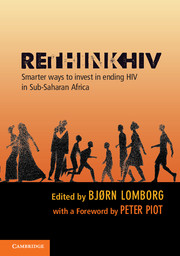7 - Findings of the Nobel laureate economist expert panel
Published online by Cambridge University Press: 05 November 2012
Summary
In September 2011, a panel of economic experts, comprising five of the world's most distinguished economists, convened at Georgetown University to interview the authors of the eighteen research chapters presented in RethinkHIV. The members of the Georgetown University Expert Panel were:
Professor Ernest Aryeetey, Vice Chancellor, University of Ghana;
Professor Paul Collier, Director, Centre for the Study of African Economies, Oxford University;
Professor Edward Prescott, Arizona State University (Nobel laureate);
Professor Thomas Schelling, University of Maryland (Nobel laureate);
Professor Vernon L. Smith, Chapman University (Nobel laureate).
During the roundtable meeting, the panel appraised the research and engaged with the eighteen sets of authors. This built on the panel's experience over the course of 2011 of examining and reviewing draft versions of the research papers.
The panel was tasked with answering the question:
If we successfully raised an additional $10 billion over the next five years to combat HIV/AIDS in sub-Saharan Africa, how could it best be spent?
In ordering the proposals, the panel was guided predominantly by consideration of economic costs and benefits. The panel agreed that the cost-benefit approach was an indispensable organizing method. In setting priorities, the panel took account of the strengths and weaknesses of the specific cost‐benefit appraisals under review, and gave weight both to the institutional preconditions for success and to the demands of ethical or humanitarian urgency.
- Type
- Chapter
- Information
- RethinkHIVSmarter Ways to Invest in Ending HIV in Sub-Saharan Africa, pp. 337 - 349Publisher: Cambridge University PressPrint publication year: 2012



